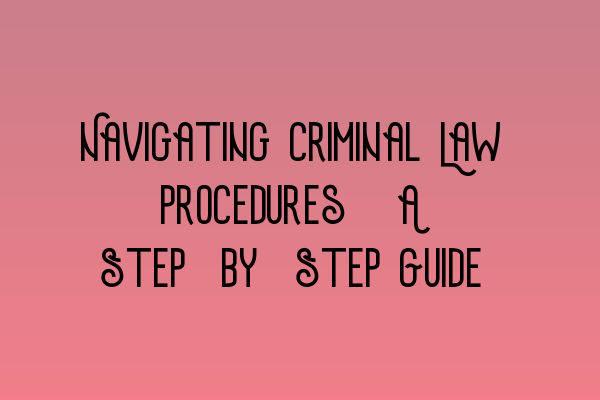Navigating Criminal Law Procedures: A Step-by-Step Guide
Welcome to SQE Criminal Law & Practice Law UK! If you find yourself facing criminal charges or simply want to gain a better understanding of the criminal law procedures in the UK, you’ve come to the right place. Our team of expert solicitors is here to provide you with a step-by-step guide to help you navigate through the complex legal system.
1. Arrest and Detention
The first step in any criminal case is the arrest and detention of the suspect. This occurs when the police have reasonable grounds to believe that a person has committed a criminal offense. It is crucial to remember that you have the right to remain silent and seek legal representation. If you need assistance in choosing the right legal representation, you can consult our article on Legal Representation for Delaware LLCs in the UK: Expert Advice.
2. Police Investigation
After the arrest, the police will conduct an investigation to gather evidence against the suspect. This may involve interviewing witnesses, collecting physical evidence, or conducting forensic examinations. It is important that you understand your rights during this process. Our article on Ensuring Ethical Business Practices: Delaware’s Code of Conduct provides valuable insights into ethical practices in legal proceedings.
3. Charges and Bail
If there is sufficient evidence, the police will forward the case to the Crown Prosecution Service (CPS) for a decision on whether to press charges. If charges are brought against you, the court will determine whether you should be released on bail or held in custody throughout the proceedings. Understanding the factors that influence the court’s decision can be beneficial. Read our article on Legal Challenges for UK Businesses in the U.S.: Strategies for Overcoming Hurdles for strategies to overcome legal challenges.
4. Pre-trial Preparation
During the pre-trial phase, both the defense and prosecution will engage in the discovery process. This involves exchanging evidence, witness statements, and any other relevant information. It is crucial to have a solid defense strategy in place at this stage. To gain an in-depth understanding of the British legal system, our article on UK Criminal Law: An In-Depth Analysis of the British Legal System can prove invaluable.
5. Trial Proceedings
The trial is where the evidence is presented, witnesses are examined and cross-examined, and legal arguments are made. It is essential to have competent legal representation to ensure your rights are protected. If you’re looking for effective strategies to overcome legal challenges during trial, our article on Legal Challenges for UK Businesses in the U.S.: Strategies for Overcoming Hurdles offers valuable insights.
6. Verdict and Sentencing
After the trial, the jury or judge will deliver a verdict of either guilty or not guilty. If found guilty, the court will proceed to sentencing. The severity of the sentence will depend on various factors such as the nature of the offense, the defendant’s criminal history, and any mitigating or aggravating circumstances. It is important to consult with an experienced solicitor who can advocate for the most favorable sentencing outcome.
We hope this step-by-step guide has provided you with a better understanding of navigating criminal law procedures in the UK. If you require legal advice or representation, please don’t hesitate to contact SQE Criminal Law & Practice Law UK. Our team of experts is here to help you and guide you through every stage of the legal process.
